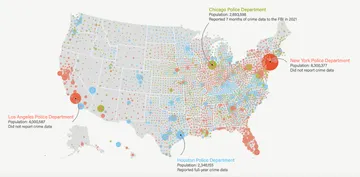How often does race come into play when cops stop motorists? The answer is: Nobody really knows. In the last few years, videos of traffic stops have created a national debate about the way law enforcement treats minorities. The case of Sandra Bland, an African-American woman who died in jail after a Texas state trooper stopped and then arrested her in 2015, is among the recent examples of confrontational behavior by officers caught on tape.
Bland’s case and others have spurred calls for more reliable information — everything from police video to data logged every time someone is pulled over — because traffic stops are one of the most common ways members of the public interact with the police.
But this information is hard to come by because of a patchwork of laws and regulations across the country, a research project at Stanford University has found. The project — Law, Order & Algorithms — has found that even though a little more than half the states, 31, routinely collect data on race (based on officer perception), the way it’s collected is far from uniform.
Even where data exist, some states have not analyzed it. Even fewer states make the information available for public review.
In Nevada, officers record the driver’s race only if they issue a ticket or make an arrest. In South Carolina, officers note a driver’s race only when the driver is not ticketed or arrested. Georgia has a spot on its traffic warning forms for race, but not on its tickets. Even then, troopers aren’t required to fill it in. At least three states collect information but don’t compile the data or analyze it. Maine, for example, collects the information on paper only.
In the rest of country, 15 states either did not respond or did not say whether, or how, any data were collected. Four states said they did not track the race of drivers they stop at all. In one of those, Louisiana, the state police said it was “not required to maintain such information because we have a written policy against racial profiling.”
The Montana Highway Patrol has been recording the race of every driver it stops since 2003 but began paying outside researchers to examine the data for bias only since 2012. In 2013, the patrol was sued, accused of detaining Latinos for minor traffic violations as a way to check their immigration status. The state settled that lawsuit in 2015. The patrol didn’t admit to any wrongdoing but agreed to continue paying for outside analysis of highway patrol stops, to adhere to its policy against racial profiling and to put more oversight in place.
Without knowing who is stopped by whom and why, understanding how police can improve their interaction with minorities is difficult, experts said.
“We think that there are issues, but nobody is minding the chicken coop anymore,” said Jim Taylor, legal director for the American Civil Liberties Union in Montana, which has decided to obtain and analyze state patrol stops itself.
At Stanford, researchers and journalists are seeking to gather and analyze as many as 100 million traffic stops across the U.S., with support from the Knight Foundation. The goal is to assemble and put online existing traffic-stop data for journalists and academics.
In 2015, California and Rhode Island enacted new laws requiring state and local police agencies to collect and report stop-and-search information. The Obama administration also recently began the Police Data Initiative to study ways to improve community policing, particularly in diverse communities.
“I think there are many, many agencies out there that are conducting daily operations that have no idea of how those operations might be impacting different communities or different people,” said Jim Burch, vice president for strategic initiatives with the Police Foundation, a national organization working on the Obama initiative.
In Missouri, police agencies have been collecting information on race since 2000, but the takeaways are limited because the state won’t release the traffic-stop data, said Richard Rosenfeld, a professor in the criminology department at the University of Missouri-St. Louis who is one of the academics the Missouri Attorney General’s office hires each year to analyze the data and produce a report.
Rosenfeld and his colleagues have asked Missouri to make incident-level data from every police agency publicly available, something the city of St. Louis already does.
They also have asked that police officers record where the driver lives when making a stop — something they don’t do now.
In response, the Missouri Attorney General’s Office said it will call on the Missouri legislature to decide “how to make the annual vehicle stops report more meaningful.”
While Missouri pays outside experts to look at some data, other states, like Washington, no longer do. The last time was in 2007 as part of a federally funded grant.
“When it comes down to actually doing it and hiring someone to do it, money is an issue,” said Captain Monica Alexander, a spokeswoman for the Washington State Patrol. Instead, she said the agency itself tried to discern patterns by conducting random audits of ticketing and traffic stops twice a year.
But experts like Sharad Goel, a Stanford assistant professor in management science and engineering who is involved in the Stanford project, said outside analysis can be key. “When you have more eyes looking at these problems, you tend to get better solutions.”
Burch, from the Police Foundation agrees, saying that agencies often ask questions framed around “the business of policing.”
“By having the community do the analysis,” he said, “they may find things that the agency never thought to ask or didn’t realize.”
Some states are taking steps to improve the way they collect and analyze data. For more than a decade, Connecticut’s 106 police departments tracked the race of the drivers they stopped through paper forms in varying formats. Beginning in 2012, the state developed a standardized method and switched from paper to a computerized system, said Ken Barone, policy and research specialist at the Connecticut Racial Profiling Prohibition Project. The state pays for the project, which analyzes the data, addresses issues of bias and posts the data online.
Last year, Gov. Jerry Brown of California signed legislation modeled after Connecticut’s that requires state and local police agencies to report stop data to the state attorney general every year. The first reports should be available by 2018.
Oregon also enacted a law last year to better assess racial profiling, but didn’t mandate that race of drivers stopped be collected. This year, a task force expects to recommend that race be collected and analyzed as well.
“If we’re going to take the time to invest in the collection of traffic stop data, we also need to invest in figuring out what that data means,” said Aaron Knott, legislative director at the Oregon Attorney General’s Office. “Otherwise why do it?”
Sam Corbett-Davies, Jan Overgoor, Emma Pierson and Camelia Simoiu, Ph.D. students at Stanford University and part of the Law, Order & Algorithms project, contributed to this report. The project is a partnership between assistant professor Sharad Goel in the Stanford Department of Management Science & Engineering and Stanford journalism lecturer Cheryl Phillips and Vignesh Ramachandran with the Stanford Computational Journalism Lab. The group is gathering and analyzing about 100 million traffic stops across the U.S. and expects to make all the data available online.
An earlier version of this article incorrectly stated that the Montana Highway Patrol began examining its traffic stop data for racial bias as part of a lawsuit settlement. The agency began analyzing the data before the lawsuit was filed.

